Page 5 • (112 results in 0.039 seconds)
-
Jane Austen’s Pride and Prejudice (1813), describes a society whose members, constantly fearing the loss of personal reputation, ask themselves this question like a reprimand: What will people say? The title’s timeless alliteration also displays how words shape reputation’s near relation–memory. Soniah Kamal’s Unmarriageable (2019),…
in its romanized form, likely a Ballantine Press print standardization, but one that nonetheless caters to the English language’s Latin alphabet. By writing in English, Kamal speaks to women like Alys who might not read Urdu but need to see themselves represented in literature. If Kamal writes about the boundaries language and society set for individuals, especially women, and particularly women in Pakistan, Kamal’s linguistic pluralism precedes Alys’s social barrier crossings. As Kamal traverses
-

Michael Halvorson ’85 was a technologist before he was a historian. His PLU undergraduate degree is in computer science and he worked at Microsoft for the first 10 years of his career. He spent the next 15 years writing books about software and emerging technology.…
or negatively by more conservative societies. In some cases there were laws against innovation, particularly religious innovation, because creatively exploring existing religious traditions felt threatening or revolutionary. It’s really only been in the last 75 years or so that innovation has been largely viewed as positive within society. Generally speaking, how do students enter your classes thinking about innovation, and how do you and your colleagues in the innovation studies program look to
-
Originally Published 1999 “The Artist, the thinker, the hero, the saint —who are they, finally, but the finite self radicalized and intensified? . . . The difference between [them] and the rest of us . . . is a willingness to undergo the journey of…
. Finally, my students are free. The asceticism of teaching entails respecting their freedom.While respecting the freedom of my students is prior to all else in teaching humanities, there still is much that I do to invite them into the space where the power of the humanities resides. I introduce them to the field of American religious history in the most engaging way possible, letting them see my own fascination with it. l show them issues; require them to translate material from one frame of reference
-
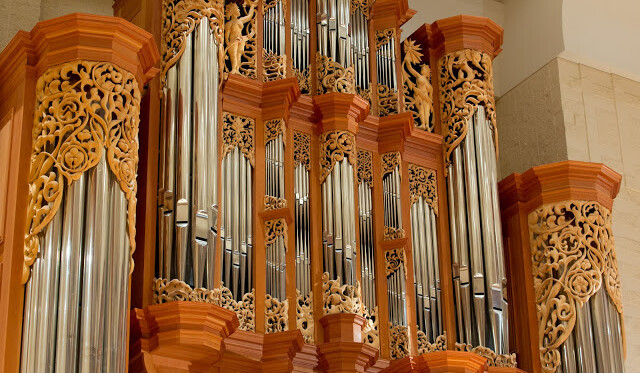
Beginning in Fall 2024, PLU will be welcoming Dr. Justin Murphy-Mancini as the Inaugural Paul Fritts Endowed Chair in Organ Studies and Performance . Murphy-Mancini began organ study at age 10, beginning his journey in church, “quite literally as soon as I was tall enough…
added. Murphy-Mancini is looking forward to sharing his passion for early music and music by living composers. Murphy-Mancini will join PLU from the University of Southern Maine, where he currently serves as organ faculty in the Osher School of Music. He also brings his experience as director of church music at First Religious Society, Unitarian Universalist, in Massachusetts. He holds a Ph.D. in composition from the University of California, San Diego, an M.M. in historical keyboards from Oberlin
-
Free pizza, for a cost Eat if you want, but it will cost you. That was the message last week as once again the Pacific Lutheran University’s student chapter of the Society of Professional Journalists created the “Republic of Parkland” in Red Square. In exchange…
sign a contract or passport giving up their First Amendment rights. As the students ate, a dictatorial “queen” of the republic issued edicts and gave orders to “enforcers.” The university’s theater department dressed as the enforcers and queen, as well as some of the protestors. Students acted out the parts of contemporary political and religious figures such as Gandhi and Sen. John McCain. A street theater with a civics message, the event included students dressed as monks literally being thrown
-
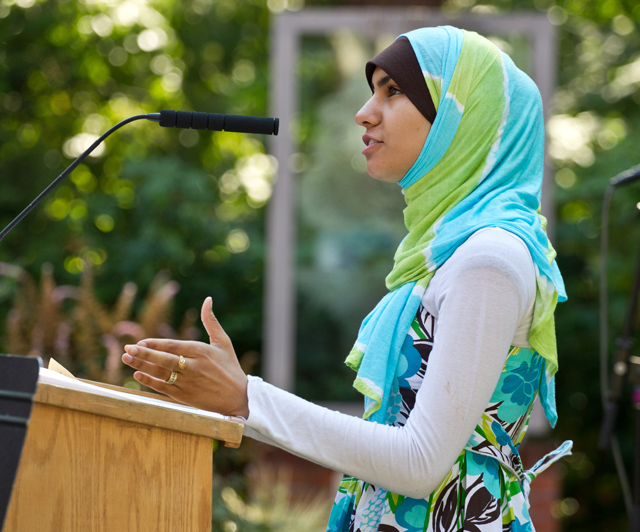
Bashair Alazadi, who helped form the Muslim Association and Allies this fall, spoke of Islam and its similarities with Christianity and Judaism at the service. (Photo by John Froschauer) Remembering 9/11 and looking to the future By Barbara Clements It is right to remember the…
innocents, and that 9-11 was a political, not a religious act of violence. Representatives from the Secular Student Alliance, the Pan-Orthodox Organization and the Oseh Shalom Jewish Club also spoke at the gathering. On Saturday, the commemorative events continued, as the PLU community participated in a Day of Service. Volunteers helped individuals with yard work in the Parkland community. Finally on Sunday, the 10-year anniversary of the attacks, the first of the Richard D. Moe Organ Recital Series
-
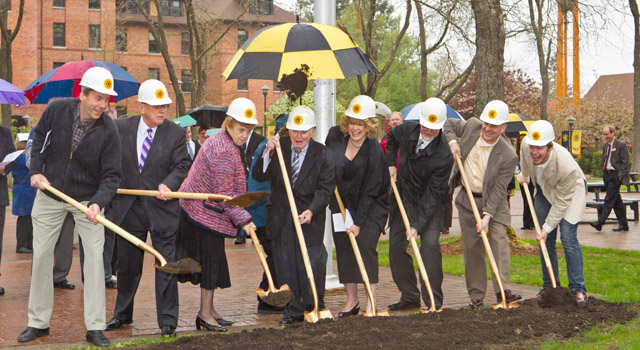
John Korsmo ’84, President Loren J. Anderson, Sigrunn Ness, Kaare Ness, MaryAnn Anderson, Bruce Bjerke ’72 – chair of the Board of Regents, Bob Katica – BCRA Design, and Jordan Beck ’12 turn the dirt for the groundbreaking of phase II of the Karen Hille…
of the Eastvold Auditorium. Construction should be complete in 2013. It will be a place of learning, a new home for amazing theater, a religious center and a treasure for the whole south sound community, Anderson said. This has been a dream in-the-making for a long time, said Bruce Bjerke ’72, chair of the Board of Regents. “It just took all of these stories coming together to make this possible,” he said. Read Previous Loren and MaryAnn Anderson University Center dedicated Read Next Farewell
-
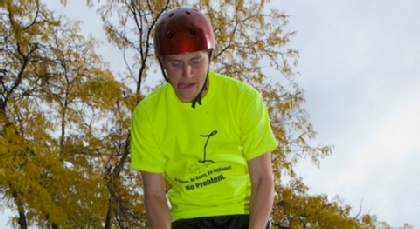
I never thought I’d start a Unicycle club (and people would actually come) By Steve Hansen In the summers, Tyson Bendzak’s dad used to ask kids who came home from college if they brought their unicycles to campus with them. He’d taught a majority of…
, religious and diversity issues, like Advocates for Social Justice, the Alijah Jewish Club or the Black Student Union. Others are for … well, because, why not? There’s Hip Hop 101, the Anime Club and, once, even a Meat Club, where students met once a month and grilled meat. The point is, there are tons of clubs at PLU. All are welcome. Students who want to meet others with similar interests – or learn about something totally new – will have many places to go. And if you don’t see something you are
-
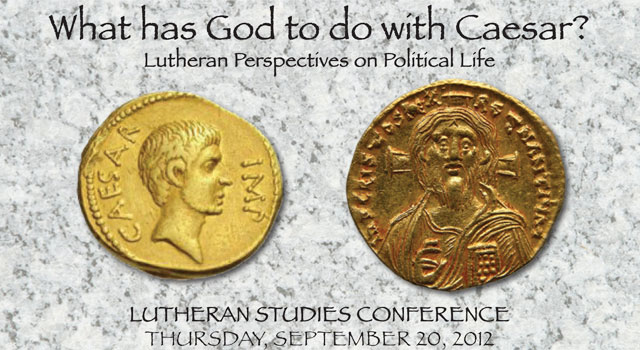
The Lutheran Studies Conference on Political Life examines: “What does God have to do with Caesar?” Lutheran Studies conference examines the Lutheran perspective on political life This year’s Lutheran Studies Conference on Political Life is inspired by the enduring question: “What does God have to…
the extreme religious left and right. In this context, the second Lutheran Studies Conference highlights the distinctive voice of Lutheran scholarship on the relationship between faith and politics. Through presentations, conversation, artwork, new publications, and the open exchange of ideas, participants will be inspired to consider the enduring question: What has God to do with Caesar? Presentations will be held from 2 to 5:30 p.m. and the keynote address starts at 7:30 p.m. Thursday, Sept. 20
-
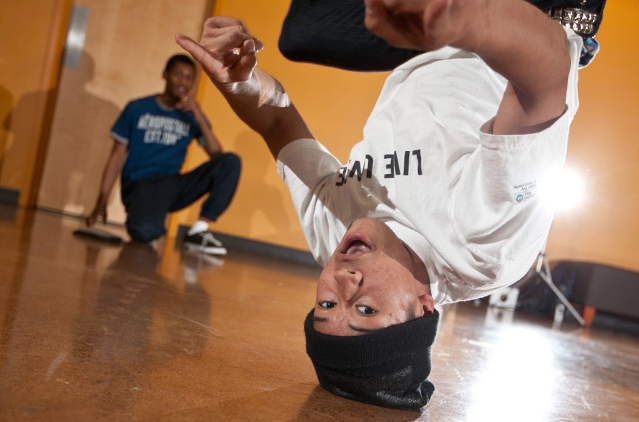
Anthony Chan Bounleurt – spinning on his head. (Photo by John Froschauer) There’s a faith club for that By Barbara Clements It could be any evening on the ground floor of the University Center: A group of young men and women – about 25 of…
, students from all backgrounds and religious traditions attend PLU. That is what the Lutheran tradition is all about – making sure all faiths and perspectives are respected. It ensures a vibrant, intellectual spirit takes hold on campus, where students and faculty are open to ideas, new philosophies and intellectual diversity. For instance, take Bashair Alazadi ’13. As a commuter student, she didn’t have a residence hall room where she could pray five times a day, as prescribed by Islam. So she went to
Do you have any feedback for us? If so, feel free to use our Feedback Form.


